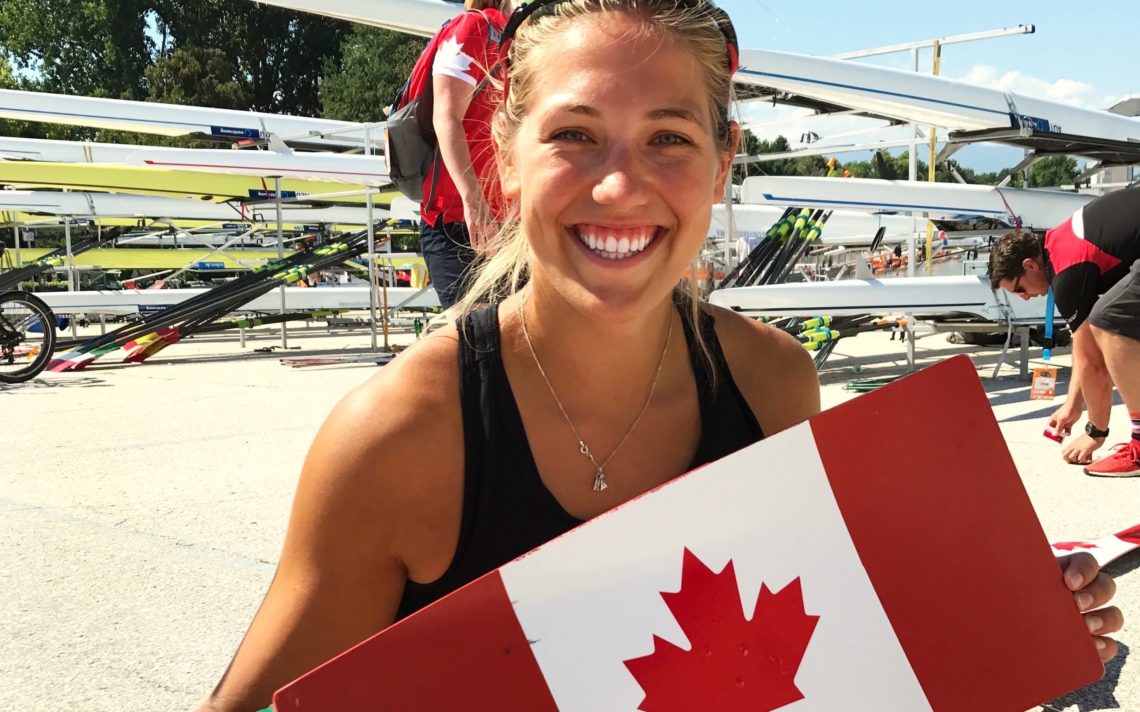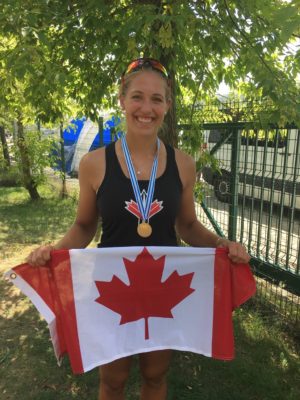
Rosts relishes return to rowing
Ridley Graduate Boat Club member Morgan Rosts was one athlete who wasn’t disappointed to see the 2020 Tokyo Summer Olympic Games postponed until 2021.
In early March as the 24-year-old Jordan native was preparing to compete for an Olympic seat at Canadian National Training Centre in Victoria, B.C., it was discovered that she had fractured a rib through overuse. Shortly afterwards, Canada pulled out of the Games and then the Games were officially postponed until 2021.
Rosts decided to fly home and stay with her parents and younger brother Stephen Rosts, a scholarship rower at the University of Washington.
“It was great because I was able to heal and not have to rush or feel the pressure of coming back and trying to make the team,” the Governor Simcoe alumna said. “If the Olympics had happened, I would have had to recover really quickly so that I could still do the selection. I would have been pushing it really close.”
The time off allowed her to regain her health.
“It has healed up, I feel great and I am a lot stronger and fitter then I was pre-injury,” she said. “I felt really good about coming back.”
The former University of Virginia scholarship rower and education grad returned to Victoria at the end of July. The training centre had reopened in June.
“They were flexible with our return date, which was great. They wanted everyone to feel comfortable coming back and I wanted to make sure that I was fully healed.”
Her goal when returning was to train at full speed and with maximum effort.
“It is really positive to be back with the team and it’s great that we have been able to row even though it is in small boats.”
 The four-month break was the longest one Rosts has had since starting rowing in high school.
The four-month break was the longest one Rosts has had since starting rowing in high school.
“In high school, I was rowing and playing a high level of basketball and I was never home. I was always on the go,” she said. “It was definitely the physical and mental break that I needed and it confirmed that I really wanted to come back, keep rowing and push for this dream.
“Having that time to step away from the sport allowed me to really consider what I wanted to do this year and it solidified my passion for this sport.”
Rosts agrees it is difficult to train with all the uncertainties about when she will compete again.
“In rowing, we are used to doing a lot of training for very few races anyways but it is hard not knowing if we will get to race even next year. As a team, we are creating a positive culture and a great training environment and what we want to put forward is still having fun.”
Fun is a crucial element for Rosts and all her teammates.
“Even if the Olympics don’t happen, we don’t want to regret the whole year of training and wishing that we had done things differently.”
In Victoria, Rosts trains six times a week. Depending on the day, there are two or three training sessions. Thankfully, she receives enough carding money from the government that she can focus solely on rowing.
“I am in a way better place now because that covers all the rent and food. It is hard to have a job just because of all the time constraints.”
Among the COVID-19 protocols in place are: scheduled arrivals and departures at the training centre and on the dock; hand sanitizing upon arrival at the centre; small training groups; rowers have their own oars and they carry them back and forth from the water; athletes have to wear a mask everywhere at the training centre except when they are rowing; and the boats are cleaned and sanitized before they are returned to the boathouse.
“It was definitely an adjustment and it takes up more time, but we’re allowed to row and I am very thankful for that. We will do whatever we can to to keep us all safe and stay on the water.”
Before the pandemic, Rosts was volunteering once a week at the Little Steps Therapy Centre to help out and get some experience working with kids in speech language pathology. This summer, she started an on-line course at Athabasca College to take care of one of the prerequisites she needs to get into grad school.
Rosts isn’t sure about her long-term future in rowing but she plans to reassess things next year.
“I do want to go back to grad school so I have to figure out timing because I want to go back and become a speech language pathologist,” she said. “I am still young so I want to make the Olympic team, see how it goes and then kind of reevaluate after that.”
Already on her rowing resume are under-23 gold medals in the eight in 2017 and 2018 and a 12th-place finish in a four at a 2019 World Cup event in Rotterdam, Netherlands.
In 2019, she also made her first appearance at the senior worlds as a spare for Canada in the eight and four in Ottensheim, Austria.
“Because it was the Olympic qualifying regatta, it was very stressful,” she said. “The atmosphere was a lot more tense because there is so much pressure on the regatta.”
She practised with the eight as it prepared for the regatta so two other women who were in the eight could train in the pair.
“It was a crucial time but it was amazing because all of our sweep boats qualified for the Olympics. We have spots for the pair, four and the eight,” Rosts said. “It was amazing that we helped qualify the boats for the Olympics and it was a really cool experience to be in that environment and accomplish that goal.”


























